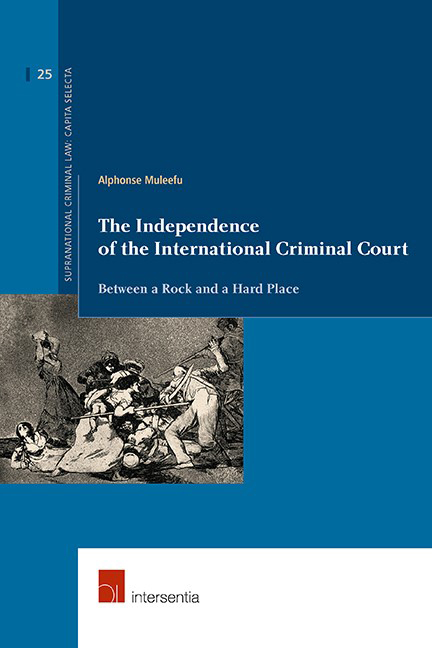Book contents
- Frontmatter
- Book part
- Dedication
- Preface
- Contents
- List of Abbreviations
- Chapter 1 General Introduction and Some Points of Departure
- Chapter 2 Competing Narratives about the ICC
- Chapter 3 The ICC Prosecutor's Decision-Making Process
- Chapter 4 Between Independence and Pragmatism
- Chapter 5 Concluding Remarks
- Bibliography
- Index
- About the Author
Chapter 2 - Competing Narratives about the ICC
Published online by Cambridge University Press: 15 November 2019
- Frontmatter
- Book part
- Dedication
- Preface
- Contents
- List of Abbreviations
- Chapter 1 General Introduction and Some Points of Departure
- Chapter 2 Competing Narratives about the ICC
- Chapter 3 The ICC Prosecutor's Decision-Making Process
- Chapter 4 Between Independence and Pragmatism
- Chapter 5 Concluding Remarks
- Bibliography
- Index
- About the Author
Summary
There is a lot written and said about the International Criminal Court and its work, with equal amounts of praise and criticism. The purpose of this chapter is to present discursively the two dominant, ‘seemingly‘ competing, narratives about the Court's relationship with Africa. The first story is of people who see the Court as one of the best things to have happened to Africa. This narrative depicts the Court as the main (if not the only) solution to Africa's struggle against its widespread culture of impunity. The second story is of those who see the Court as another ‘northern’ tool created to dominate, control and abuse Africans, for external interests. This narrative suggests cautious collaboration or complete resistance, if there is no change. The major disagreement between these two stories concerns the Court's independence and legitimacy, especially relating to its selection of situations and cases almost exclusively in Africa. Narratives, as Linde argues, can be used to describe an institution, criticise it, reshape it or defend it.
The majority of the supporters of the Court are its officials, NGOs and some international criminal law lawyers, whereas critics are, among others, some African leaders and opinion-makers. However, the main focus here is not so much on arguers but on their arguments. The purpose is to present discursively the two narratives ; a narrative of those who criticise the Court and a narrative of its supporters. After a presentation, a mock dialogue is created between the two narratives. This is important because it seems that these two opposing arguers are not interested in a direct discussion. In the dialogical approach, each narrative responds to the other. Through a critical discourse analysis (CDA), contradictions, misinformation and exaggerations are identified on both sides.
In the creation of each side's story, there is a combination of both official statements, those speaking on behalf of institutions (ICC/NGOs or AU/African leaders), and views of others not speaking in official capacities, but whose talks or texts reinforce the position of either side.
- Type
- Chapter
- Information
- The Independence of the International Criminal CourtBetween a Rock and a Hard Place, pp. 21 - 52Publisher: IntersentiaPrint publication year: 2019



